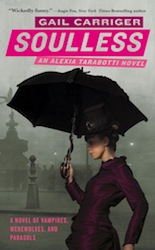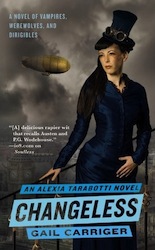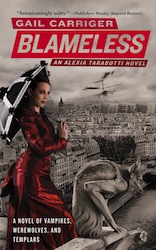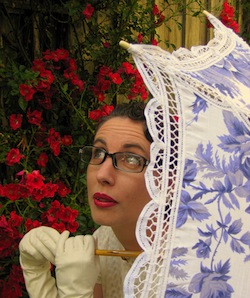Gail Carriger is an archaeologist and the author of paranormal/steampunk/comedy with sexy bits, better known as the Parasol Protectorate series: Soulless, Changeless and Blameless (due September 1). We met for tea and conversation in the parlour of a well-appointed dirigible drifting pleasantly over Kensington. We spoke of science, language, the nature of the soul and the intrinsic humor of pickles.
Jason Henninger: A lot of interviews with you don’t really get into the archeological side of your life. I’d like to know more about that. And, you specialize in ceramics? How did that come about?
Gail Carriger: I fell into it, as you do. Most people in archeology find their specialties in strange and unique ways. I always wanted to do archaeology, and then the time came for me to actually be in the field, and it was excruciatingly boring. Excavation is really, really boring. It seems like a really romantic profession, archaeology, but at its heart it’s super OCD. The bulk of the work is mind-numbingly dull. Don’t get me wrong; I absolutely love my work but it requires a certain kind of personality, and that personality is not the whip-cracking, fedora-wearing sort.
Fortunately for me, I sliced open my finger while cutting bread for lunch, out in the field. I couldn’t excavate anymore that season, since I couldn’t get dirt in the injury. So I was sent to work in the field laboratory instead. I was already a potter and this was a classical site in Tuscany, so it was mostly ceramics. They discovered they could put a potsherd in front of me and I could ID it without being taught anything. Like, this piece has wheel striation marks, this was thrown, that one was hand-built and that one is a cooking vessel. I discovered that I had better hours, cleaner facilities and got to look at the best artifacts without digging through the dross first! I wanted to keep exploring that side of archaeology, and so academically got into the technology of ceramic production.
I have a Masters of Science, and that degree is in the analysis of inorganic artifacts: glass and metal as well as ceramics. As a field archeologist one usually has to specialize in a particular part of the world, or specific culture, whereas if one is a materials specialist one can jump around to different areas. So I’ve had experience on excavations all over the place. They call me in when something looks like it might fit in to my field of expertise, which is ceramic technological development, early kiln technology, and paste/glaze interaction.
Henninger: Roughly what century are you talking about?
Carriger: Depends on where you are. The current excavation I’m working on is in Peru. It’s a long occupation site that starts with the Wari and goes to the Inca and ends with the Colonial period. The field supervisor thought there might be evidence of kilns, and kilns are my specialty, so she brought me in. Early kilns arise at different times in different areas, in Peru we’re talking the 16th century, which is really quite recent. But I started out on an Etruscan site that had no glazes but had kiln technology, and that was around 500 BC.
Henninger: In Changeless, you talk about werewolves in Egypt and—for reasons I won’t mention because of spoilers—you say archeology becomes a forbidden subject for them. Considering your career, didn’t that limit how much you could use your own scientific background?
Carriger: Yes, it does to a certain degree. But I’ll sneak in things I’ve learned. I never intend to have archaeology integral to the story, though. As to other aspects of science, that does come into play. Werewolves are the least scientific group, but even though Alexia is allied with them, I don’t feel confined to their POV. Readers still get peeks at what the vampires and human scientists are up to. There’s definitely some interest all around in antiquities and antiquities collecting.
But of course one of the major differences between my world and the actual world of archaeology in the Victorian era, the birth of archaeology as a discipline, is that my Victorians can ask a vampire, if they’re old enough, to describe the Roman period, for example. They may not tell you the truth, but that certainly puts a different dynamic to any historical profession if actual immortals are running around.
It’s one of the things that I’ve really enjoyed thinking about, interacting with immortals. It sparked a lot of the oddball bits of my world, the concept of long-lived individuals: how eternal life would effect their behavior, their emotions, what they find interesting and what they’re bored with. In archaeology one is always finding these little unexplainable things, or coincidences that are cross-cultural. So I used these as evidence of immortality and essentially re-wrote history, saying, for example, that werewolves ruled Egypt, and thus gods with animal heads reflect a werewolf obsession.
Henninger: The language in your books sounds a lot more contemporary than Victorian novel style.
Carriger: That’s entirely intentional. The initial draft was quite a bit more Victorian. I’d been reading way too much Gaskell at the time. I pulled it back. I came to writing from the Young Adult tradition, and one of the reasons I enjoy Young Adult fiction so much is that it’s kind of…easy? Comfortable is maybe a better word. Not that it’s lacking in complexity or depth, but it’s faster paced than some adult novels, especially literary Great American Novel types.
I wanted to bring that spirit to the book. I don’t want my writing to be work to read. My main goal is completely shameless entertainment. I want people to smile and giggle and enjoy the book. I’m not trying to save the world through literature. So it started out super Victorian but I toned it down. And when I sold it to an American house, I had to make it American English. American spelling and lingo and phrasing as well. I also changed some of the vocabulary to still Victorian but more modern-sounding terminology. I couldn’t use words like ratiocinative, which is a great word but everyone has to look it up in the dictionary.
Henninger: Speaking of words, you said once that parasol was a delicious word.
Carriger: It is! There are some words that are just intrinsically fabulous.
Henninger: Tell me some intrinsically fabulous words.
 Carriger: Kumquat. You can’t say that without giggling inside. Or pickle, gherkin, or cornichon. British English, in particular Victorian English, is full of these great words. Like kerfuffle or canoodling. Wonderful. It’s part of the reason I have such ridiculous names in my books, like Mrs. Loontwill. Partly because they actually existed in British aristocracy and I’m doing an ode to P.G. Wodehouse and Dickens, but also because they are fun to say.
Carriger: Kumquat. You can’t say that without giggling inside. Or pickle, gherkin, or cornichon. British English, in particular Victorian English, is full of these great words. Like kerfuffle or canoodling. Wonderful. It’s part of the reason I have such ridiculous names in my books, like Mrs. Loontwill. Partly because they actually existed in British aristocracy and I’m doing an ode to P.G. Wodehouse and Dickens, but also because they are fun to say.
Henninger: Ivy is a very Wodehousian character. I thought she’d have made a good match for Bertie Wooster.
Carriger: She is a nod to Wooster in particular, this foppish dimwit, only in feminine form. Wodehouse’s females are often Alexia-like, these battle-axe, dominating aunts or matrimonially driven young women. He has one or two supercilious ladies. Ivy is definitely more a Wooster sort. I love Wodehouse’s humor.
Henninger: The Steampunk literature that’s come out in the last few years doesn’t have a lot of humor, from what I’ve seen. Which is odd, because people into Steampunk are a clever bunch. But there’s not a lot of humor writing.
Carriger: There isn’t a lot of humor in science fiction and fantasy in general. You can name the big ones like Douglas Adams or Terry Practhett or Christopher Moore. And there are great writers, like Connie Willis, who will write a humorous piece from time to time, but it’s not a genre with a lot of humor in it overall. Steampunk is often quite dystopian. You’ll see the books described as gritty or dark. But there is Girl Genius, which is one of the early bastions of the steampunk movement and that is definitely humor. So there’s one. And now there’s me!
Henninger: On a more serious note, I wanted to talk about the function of soul in your books. In your stories, soul is a quantifiable thing, with some people having an excess of soul. You can have a soul and not be alive, or be alive with no soul. What is the relationship between soul and life? Most people would think life and soul are synonyms.
Carriger: This is a part of my books that readers struggle with. I took Victorian scientific thought, looking at the theories and practice around in 1873, and made it—at least in possibility—true. Victorians were thinking there were different levels of atmosphere, with an aether atmosphere at the top level. They’d figured out things like germs but hadn’t gotten to DNA . And some scientists had this very strange notion that the soul was physical and could be weighed. An American scientist took to weighing people who were terminally ill and then again when they died. A very separatist idea of life and soul.
I took their concepts and made them the truth of my world. I didn’t want a magic system but I didn’t want a world that played by modern rules. So there is an aether atmosphere in existence, and the counterbalance theorem does work, and so on. But a thing they haven’t yet figured out is the exact nature of the soul. Even Alexia doesn’t know. Part of the arc of these books is her determining exactly what “being soulless” means, or what “excess soul” implies. That was the spark that inspired the whole series, this notion that soul could be measured. It’s a very Victorian and alien idea. If you combine this with the scientific thought of the day, it would imply that there are different amounts of soul. That led me to the idea that maybe if one had too much, that’s what would allow one to survive being bitten. I’ve always been concerned that there would be no biological control in place if immortals existed. Why aren’t they just killing everybody or turning everyone into vampires or werewolves? There has to be a natural predator or restriction in place if they’re going to be preying on humans. I made it this excess soul idea, and added in that it’s impossible to predict if someone would survive becoming a vampire or werewolf.

Henninger: You also added a gender aspect to it.
Carriger: I did. It’s another Victorian thing, this idea that women are the weaker sex. I made it very difficult for women to become immortals. It started out with basing vampires on wasp or beehive dynamics, with one queen. Also I wanted Alexia, since she’s the main character, to be unique. She has an assertiveness that you don’t often find in Victorian women. Being a preternatural, having no soul, is even more unusual for a woman. Being scientific, I have to recognize—despite the fact that I am a feminist—that women are most of the time simply less physically strong than men, considering bone structure and height and all those things. We may have higher pain tolerance, but in simple physical terms we aren’t as strong. And that’s what comes into play when surviving being bitten. A mortal has to be strong enough to make it through this physically taxing experience. So most women can’t make it, especially a malnourished young Victorian female who has been corseted all her life.
Henninger: It’s required by law to ask you in every interview about tea. What’s the very best tea you’ve ever had?
Carriger: That’s a difficult question. Oh dear! It would be really hard to pinpoint. I do hold very strongly that tea is better in England. There’s something in the milk. They must have special cows. There’s a wonderful teashop in Exeter by the cathedral, overlooking the square, called Hanson’s. The best pot of tea is probably there. I’m a mixed tea girl, Assam-Ceylon, which is essentially what most English Breakfast teas are. I like Lapsang and Darjeeling too. I opt for mild flavor/strong caffeine tea. I don’t like tea to be too herby or fruity. Which is why I simply can’t come around to Irish Breakfast or Earl Grey. They’re never going to win me over!
Henninger: Good to have strong opinions on this.
Carriger: Yes, I always try to have strong opinions on frivolous subjects and weak opinions on serious matters. Keeps me young and irreverent.
When Jason Henninger isn’t reading, writing, juggling, cooking or raising evil genii, he rides in imaginary airships and works for Living Buddhism magazine in Santa Monica, CA










